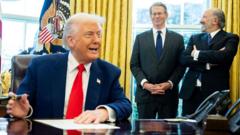Market reactions have been volatile, with rising interest rates and dwindling stock values prompting swift policy changes from the administration.
US Implements 90-Day Tariff Suspension on Most Countries Amid Trade Tensions with China

US Implements 90-Day Tariff Suspension on Most Countries Amid Trade Tensions with China
In a significant policy shift, President Trump has announced a temporary suspension of higher tariffs for most trading partners while intensifying measures against China.
In a dramatic pivot, President Donald Trump unveiled a 90-day suspension of elevated tariffs on nearly 60 countries, while simultaneously ramping up duties on Chinese goods to an unprecedented 125%. This announcement comes just hours after the implementation of new tariffs, which were generally met with significant market disruptions and fears of economic recession among Americans.
The stated reason for this policy change was to facilitate ongoing negotiations, with Trump establishing a universal "lowered reciprocal tariff" of 10% on imports from countries that refrain from retaliatory actions. However, it was China that faced escalated tariffs, accused by Trump of demonstrating "disrespect" for American trade policies after announcing its retaliatory 84% tariffs on US imports.
The White House's initial tariff framework imposed baseline tariffs of 10% on all incoming goods while reserving higher rates for nations deemed "worst offenders," including the European Union, Vietnam, and South Africa. Following the recent announcements, financial markets responded dramatically—interest on US debt reached a peak of 4.5%, the highest since February, before stocks surged as the president revealed the tariff suspension.
Trump's remarks on social media emphasized negotiations with China, claiming that if Beijing fails to adapt, the longstanding trade imbalance would not be sustainable. Treasury Secretary Scott Bessent insisted that the policy update was not a reaction to market trends but was seen by critics as a retreat in light of potential economic danger.
The rift between the two international giants intensified after Trump announced new tariffs, including an additional 34% on Chinese goods. In retaliation, China declared a 34% tariff on US imports, with both countries showing no indication of backing down. China's foreign ministry criticized US actions as "bullying," asserting that respectful negotiations are essential.
Economists warn that continued escalation could lead to substantial declines in bilateral trade, estimating it could drop by around $466 billion, creating ripple effects in global markets. Apart from China, other established tariffs on cars and steel remain unaffected by this latest development, and Canada and Mexico are exempt from the new baseline rate. The European Union is also poised to impose retaliatory tariffs in the near future, further complicating the situation as the global trade landscape undergoes immense upheaval.





















